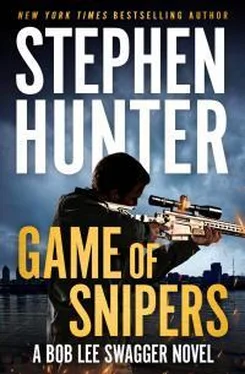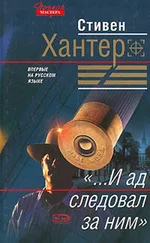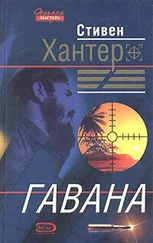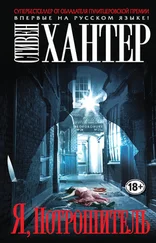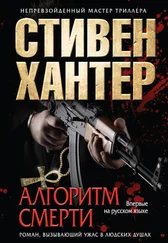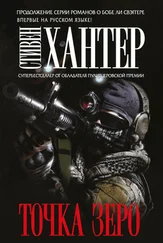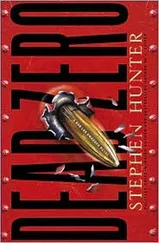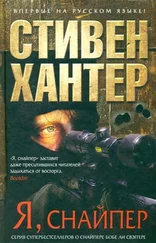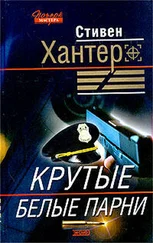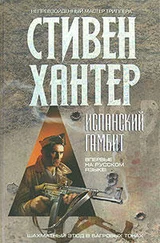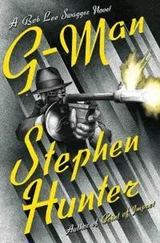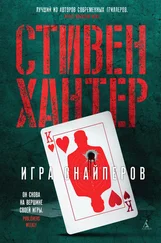Meanwhile, in Queens, SWAT units had parked during the night on blocks not far from the potential shooting sites — one of twenty-three buildings on the arc — and could get there almost as fast as the choppers. The plan was to hurl them to the newly identified shooter’s building simultaneously with the arrival of the choppers — a classic pincer move.
Swagger had little to say. As much as he hoped it would work, he didn’t believe it would. Juba was too good. Juba was better than he’d ever been. You couldn’t match ordinary brains against his and expect anything good to come of it.
“Cheer up, Bob,” said Nick. “We do this thing, have a couple of days of Mogul love and an open bar, and it’s back to Idaho and the front porch. I’m sure the deer and the antelope have missed you.”
“May I say something?” said Mr. Gold.
“A breakthrough?” asked Nick.
“Not exactly,” he said.
“Well, go ahead anyway.”
“I believe we have made an astute analysis of the evidence, and the plan itself is sound and well staffed, no half measures — and I know, from experience, that half measures are frequently catastrophic.”
“Okay,” said Nick.
“However—”
“Here it comes,” said Neill.
“It does occur to me that in one respect, hard as we have worked, we are all Juba amateurs. We’ve been in the game only a few months.”
“Yes?”
“There is only one Juba professional in the world. We are here only because of her efforts over long years. She has been tracking, imagining, stalking this fellow for over a decade.”
He paused as they all took it in.
Finally, Nick said, “Go on.”
“My thought is, at this late hour perhaps security mandates could be waived and we could reach out to Mrs. McDowell. We could put all we have — our conclusions, the time frame, the immediate anticipation of action in the countersniper plan — before her and ask her for an opinion. Well, not so much about what we plan to do but on our reading of what Juba wants to do. Maybe she’d see something we missed, maybe she’d bring an outside-the-box freshness to it, maybe there are vibrations, memes, motifs, indications, resonances, some sort of clues that we’ve missed to which she’d be sensitive. After all, we have several hours, by my watch, until the event itself is thought to transpire, so there does seem to be just enough time.”
Nick thought it over. It involved logistics, not his strong suit. He turned to Chandler.
“Is this possible?”
“Well,” she said, “I don’t think Mr. Gold means by phone, does he?”
“Face-on-face would be preferred,” said Gold. “That way, we could read her expression as she considers the analysis, which may be more elucidating than anything she might say.”
“She’s where? In the suburbs of Baltimore?”
“In the city itself, northwest Baltimore,” said Swagger. “It’s called Dorsey’s Forge.”
“What aviation assets do we have?” Nick asked Chandler.
“None. They’re all at Quantico, out of play.”
“Maryland State Police has aviation,” said Neill. “At Martin airfield, just north of Baltimore.”
“Chandler, could it work?”
“Maybe get Maryland to pick her up at some park near her home. They get her to our roof inside an hour. That would give us two hours with her to go over the stuff. I think it could be valuable.”
“Swagger?”
“She ain’t no dummy.”
“Neill?”
“Well, if nothing else, it would dispel all those little ‘if only’ doubts we have. It would represent us making every last effort, all the way to game time. No stone left unturned, that sort of thing.”
“Bob, can you call her and see if it’s even possible?”
Swagger took out his phone, punched in the number.
Two rings, three, halfway through a fourth: “Yes?”
“Janet, it’s Swagger.”
“Oh, hello,” she said.
“What’s your situation?”
“I have no situation. I’m about to clean the upstairs bathroom, in an attempt to forestall my daily martini spree another hour.”
“Is there a field, an open space, anywhere near you?”
“There’s a schoolyard two blocks away. Scott Key Elementary School.”
“Hold a second. Oh, better yet, don’t start on the bathroom. Let us do some checking at this end. Put on some comfortable shoes.”
He hung up.
“Okay,” said Nick, picking up a phone.
On-screen, they saw as in the Command Center, somebody came to the Director, and he rose and was led to a phone off camera.
Nick made the pitch.
Some chitchat, maybe the Director consulted with the White House and his staff, but, in the end, the assent was given.
“Okay,” said Nick. “Bob, call her back, read her in, and get her to that schoolyard. Chandler, get me our State Police liaison.”
“Yes, sir.”
“We’ll see what she has to say.”
1145
Finally: the ammunition.
Maybe this is how it begins. You cannot love the rifle if you do not love the ammunition. Something dense, deadly, charismatic in the heft and glint of it. Nothing on earth quite like it.
He had, after all the experimenting and all the lives of chained men perishing at a mile-plus in the wild beauty of Wyoming, settled upon this.
With the tip of his knife, he peeled open the package he had prepared in Wyoming. The ten Kings of Hell spilled out, each 3.681 inches long, slightly front-heavy, somehow oddly dense for volume, a function of the 250 grains of Sierra .338 diameter MatchKing hollow-point boattail bullet inserted and crushed into place by the pressure of Wilson’s .367 seating die.
He loved the cartridges. He loved to build them, to think them, to imagine them, to feel the weight and roll of them in his hand. He’d scrubbed them with acetone in Wyoming and now touched them with rubber-gloved fingers only. Thus, no Juba would be evident to investigators on their ultimate discovery, even if the brass was notoriously adverse to recording the prints of its handlers.
He held each one. Slightly overpressured with 91.2 grains of Hodgdon H1000 smokeless powder that filled each once-fired Hornady tube, to be ignited by a Federal 215M Magnum primer. The shell had been chamfered for smoothness, its burrs and eccentricities milled away. It had been neck-turned so that the grip of brass that secured the bullet was exactly .004 thick all the way around. It had been tested for runout — that is, deviation from the axis — and found to be within the metric of .001, which meant as close to perfect as humanly possible. It had been annealed, a brief heat treatment that made its consistency profound. The bullets themselves had been sharpened in the Whidden die, improving their long-range accuracy. All these boutique touches, which the same investigators would eventually discover, were consistent with the high craftsmanship of a champion shooter like Brian A. Waters. They matched perfectly, both as an object and as a product of a culture, with what would be observed when, weeks from this day, his house was unlocked and subjected to the most intense of forensic examinations. No one looking at the recovered shell could doubt that it had been produced by the man from Albuquerque, about to be revealed to the world as yet another lone gunman on a grassy knoll — well, an apartment — administering hatred via a death that would change the world.
He took the shells and, one by one, loaded them into the Accuracy International ten-shot magazine. As the box filled, the spring tightened and fought him more urgently. He squeezed the last one in only by applying the full pressure of his thumb against the shaft of the brass, after sliding it between the flanges of the mag and urging it back flat against its rear plate.
Читать дальше
